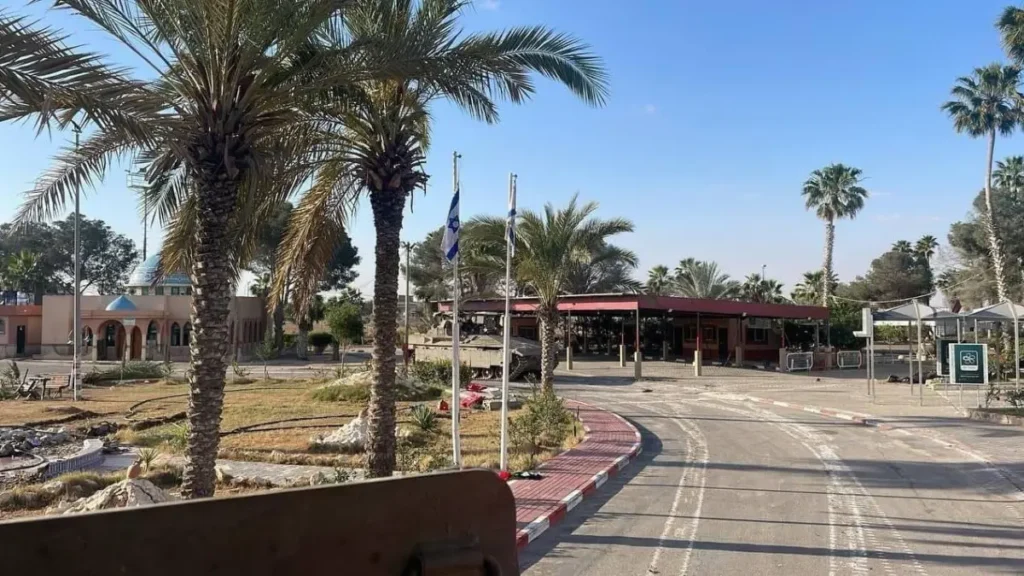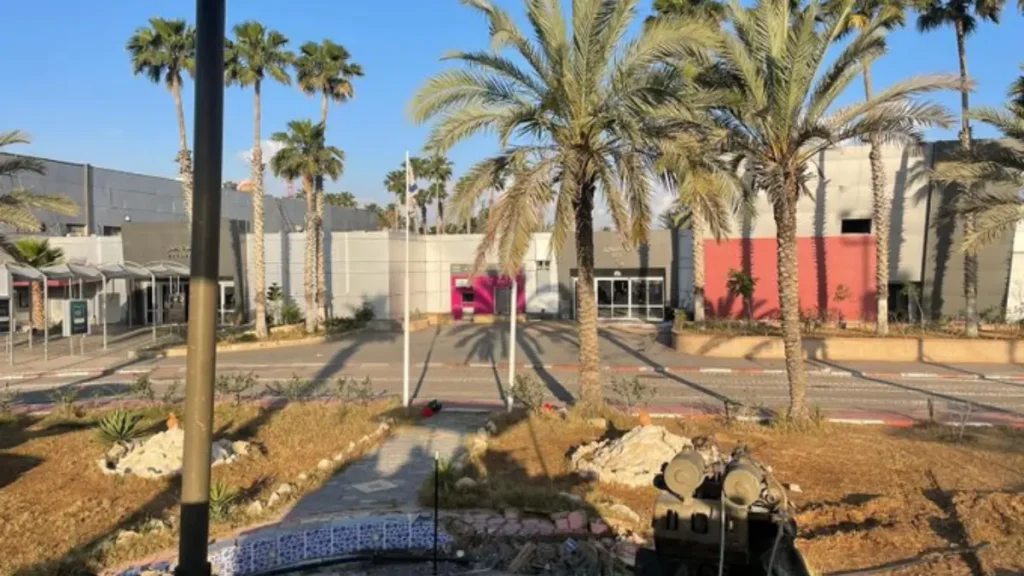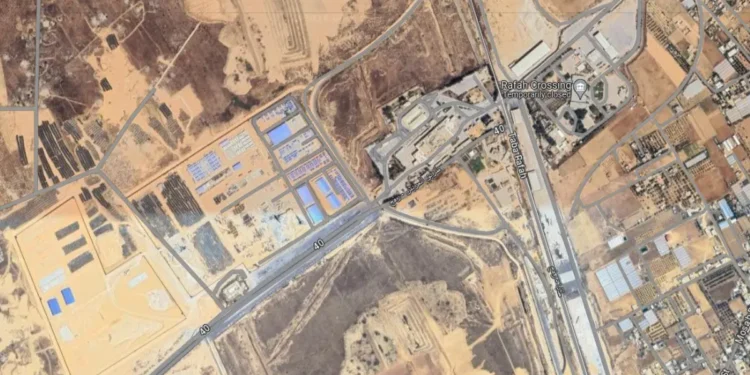The Israeli army has taken over the Rafah crossing’s Palestinian side, an essential path for help into Gaza by the Egypt border. This move stopped all going through at this south Gaza spot, as said by a person from Palestine after Israeli tanks moved in.
WHAT WE KNOW
- Israeli forces have taken control of the Palestinian side of the Rafah border crossing from Egypt to Gaza
- Rafah is an important transit hub for food, medicine, supplies and other humanitarian aid to the besieged Gaza Strip
- All traffic through Rafah has been suspended due to the earlier closure of the Kerem Shalom crossing
- This severely hampers efforts to get needed aid flowing into Gaza to feed the population
- The United Nations warns that taking Rafah could halt humanitarian aid in Gaza
- Israel says operations in Rafah are “limited” to pressuring Hamas into concessions such as a ceasefire agreement
- But this leaves hundreds of thousands of displaced Palestinians in Rafah with nowhere to go
- Already 1 million refugees had fled to Rafa during the 7-month war between Israel and Palestine

The Israeli 401st Brigade did this early Tuesday, making the Israeli army in charge of this key border area. Photos shared by Israeli forces show their flags on tanks in the taken area, matching the crossing’s known looks.
The Rafah gate is a key path for help going into the blocked area and lets people flee to Egypt. Shutting both the Rafah gate and the Kerem Shalom gate, the other big door between Israel and Gaza, in the last two days has hit hard the work to keep vital supplies like food and medicine coming in. Even with smaller gates open, this stop makes it hard to look after the health of Gaza’s people.
The Rafah crossing is the only gate out of Gaza not watched by Israel. This changed when Hamas attacked on October 7. Since then, Rafah has been key for letting in some aid and for getting a small number of Palestinians and people from other countries out. It has stood out in the crisis, being vital for these limited help efforts.

The current situation? An Israeli military spokesman revealed on Tuesday that Israeli forces had seized control of the Gazan sector of the Rafah crossing. Operations at the crossing continue, although the spokesman declined to say how long Israeli forces would occupy it. The development follows a series of deadly Israeli airstrikes targeting Rafah and Israeli directives to mandate the evacuation of Palestinians from major cities.
For aid efforts, this means for Palestinians, the seizure could “hamper humanitarian relief efforts throughout Gaza if supply lines for aid and fuel continue to be disrupted,” according to UN Relief and Works Agency for Palestine Refugees.
Regarding Israel’s wider strategic visions. The Rafah innvasion was designed to be “very limited in scale,” implacable on Hamas in negotiations to secure terms for a ceasefire and hostage release. The source emphasized that what was happening was not the extended Rafah operation Israel has been known to the world for weeks.
What danger does it present for Palestinian refugees? The future for half a million homeless people in Gaza is suddenly bleak, with thousands fleeing constant Israeli air raids. The escalation over seven months of fighting has driven over a million Palestinians to seek asylum in Rafah. Many refugees find their homes destroyed or inaccessible, particularly in the northern part of the strip.
The Rafah crossing serves as a pivotal entry point for Gaza, distinguishing itself as the sole border crossing not under Israeli control. Following Hamas’ attack on October 7, Israel closed its borders with the Palestinian territory, heightening the crossing’s significance for limited humanitarian aid ingress and the evacuation of select individuals, both Palestinians and foreign nationals.
Currently, Israeli forces have seized control of the Gazan corridor above Rafah, an Israeli military spokesman confirmed on Tuesday. Military activity continues there, although it is unclear how long the Israeli forces will be there. The development follows a series of deadly Israeli airstrikes targeting Rafah and Israeli directives mandating the evacuation of Palestinians from parts of the city
The seizure has important implications for the aid effort in Gaza. The United Nations Relief and Works Agency (UNRWA), which oversees Palestinian refugees in the Near East, has warned that the disruption of aid and fuel supplies could disrupt humanitarian aid throughout the region.
In the broader context of Israel’s objectives, sources acquainted with Israeli strategies assert that the operation in Rafah is envisaged as “very limited.” It is aimed at maintaining pressure on Hamas to accede to a ceasefire and release hostages, rather than constituting the larger-scale incursion into Rafah that Israel had been hinting at for weeks.
Also Read: Clashes Erupt on US University Campus During Protest Over Israeli-Palestinian Conflict
The situation puts Palestinian refugees in a tough spot. Lots of people in Rafah, who have been forced to leave their homes, are not sure about what to do next. Some have already fled because of the constant Israeli airstrikes. Can you believe that over 1 million Palestinians have sought shelter in Rafah during the seven months of conflict? It’s crazy! And despite many of their houses being destroyed or made unreachable in the northern part of the strip, they still find their way here.
The Israeli forces have launched a military operation at the Rafah border crossing, and the United Nations agency is sounding the alarm about its impact on humanitarian aid access in Gaza. This move by the Israeli troops has taken control of the Palestinian territory near the Rafah crossing, raising concerns about the disruption of vital aid delivery efforts. This situation has made the already dire situation in Gaza even worse, as access to essential supplies is already extremely limited.
The Rafah crossing is an important gateway for needed aid to Gaza and an important route for people seeking safety on the Egyptian border Unfortunately, the Rafah crossing between Israel and Gaza between and Kerem Shalom cross the road 48 hours ago There are closures, effectively cutting off people’s access. While there are still smaller entry points open, the closure of these main access routes is a major setback for ongoing efforts to meet the basic needs of the people in Gaza. This includes providing food, medical supplies, and other vital resources necessary for their survival.


